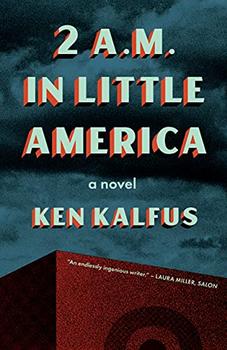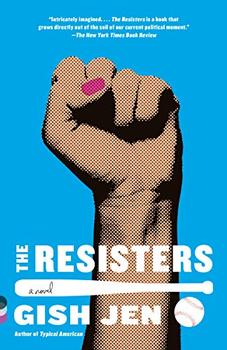Summary | Excerpt | Reading Guide | Reviews | Beyond the book | Read-Alikes | Genres & Themes | Author Bio

Listen to the news every day, catch the headlines in the paper, and you realize it isn't too much of a stretch of the imagination to picture it happening: a complete unraveling of American life as we know it. The dystopia that Chang-rae Lee richly imagines in his striking new novel, On Such a Full Sea, is segregated into three distinct tiers. The super-rich live in communities called the Charters where every need and want is taken care of. The best privilege of all: Charters are the only ones who have access to unlimited health care. On the other end of the spectrum are the open counties, where a complete disintegration of government networks means practically nothing can be taken for granted. Straddling these extremes are cities like B-Mor, whose inhabitants are mid-level toilers living in gated communities, providing food for the Charters and going about their days with a kind of deep resignation. The only way for citizens from B-Mor to ever make it to the Charters is through extreme physical prowess demonstrated in sport, or by scoring high on an annual exam given when the kids are really young.
The fictional B-Mor is closely modeled after Baltimore, a city that has seen waves of settlement and subsequent deterioration in real life. The residents who make their way in Lee's B-Mor are descendants of refugees shipped in from a small riverside town in New China. "By the time they departed, Xixu City was made uninhabitable by the surrounding farms and factories and power plants and mining operations, the water fouled beyond all known methods of treatment," Lee writes. B-Mor's primary function is to grow and ship pristine fish and organic produce to the Charters. Among the many people who make this happen, is Fan, a woman barely out of her teenage years. As the novel opens, she works the fish tanks and enjoys the occasional Free Day with her boyfriend, Reg. One day, Reg simply disappears and Fan decides she must leave B-Mor and brave the open counties, on a quest to find her love.
As Fan makes her way through danger and the open road, she meets an assorted set of characters, each a victim of the new "anything goes" society that has evolved over time. Fan is used and conscripted for various causes and the fate she meets, crafted slowly into myth, narrated in the voice of the collective citizens of B-Mor, is one the reader gets deeply invested in.
Over the years, the award-winning Chang-rae Lee has created an impressive body of extremely diverse work - from a searing look at the fallout of war to a life lived in American suburbia. The one thread that Lee effectively mines across the board is the soul-numbing effects of alienation. Jerry Battle, the protagonist in Aloft, shares this in common with Fan in B-Mor: both are keenly aware of their place in society, lived mostly on the outside looking in. "The funny thing about this existence is that once firmly settled we occupy it with less guard than we know," the B-Mors point out. "We watch ourselves routinely brushing our teeth, or coloring the wall, or blowing off the burn from a steaming yarn of soup noodles, and for every moment there is a companion moment that elides into it, a secret span that deepens the original's stamp. We feel ever obliged by everyday charges and tasks. They conscript us more and more. We find world enough in a frame. Until at last we take our places at the wheel, or wall, or line, having somewhere forgotten that we can look up." Full Sea succeeds at painting this isolation, this attention to wearying toil above all else.
Where Sea really scores however, is in outlining the deep political costs of such alienation. In a society gone dangerously awry, Lee implies the worst kind of sin is apathy. Yet in a deeply regimented world such as the one presented in Sea, what capacity for action does an individual truly have? There's a reason, after all, that Lee relies on the collective "we," the citizens of B-Mor, as his narrator.
The book's title is borrowed from Shakespeare's Julius Caesar:
There is a tide in the affairs of men
Which, taken at the flood, leads on to fortune;
Omitted, all the voyage of their life
Is bound in shallows and in miseries.
On such a full sea are we now afloat;
And we must take the current when it serves,
Or lose our ventures.
"On such a full sea are we now afloat," Lee points out, and it can make or break our fortunes. The parallels to real life are uncomfortably close; it's Lee's version of terror that he does so well - one that creeps up on the reader insidiously.
Even in Full Sea's dystopia, however, all is not lost. There are "hopeful flashes, which are, in the end, what lights our way through this ever-dimming world," the B-Mors point out. Besides, things could be a lot worse. They could be trying to make it in the lawless open counties. Or living in D-Troy.
![]() This review was originally published in The BookBrowse Review in January 2014, and has been updated for the
November 2014 edition.
Click here to go to this issue.
This review was originally published in The BookBrowse Review in January 2014, and has been updated for the
November 2014 edition.
Click here to go to this issue.

If you liked On Such a Full Sea, try these:

by Ken Kalfus
Published 2022
From "an important writer in every sense" (David Foster Wallace), a novel that imagines a future in which sweeping civil conflict has forced America's young people to flee its borders, into an unwelcoming world.

by Gish Jen
Published 2021
The time: not so long from now. The place: AutoAmerica. The land: half under water. The Internet: one part artificial intelligence, one part surveillance technology, and oddly human--even funny. The people: Divided.
Be careful about reading health books. You may die of a misprint.
Click Here to find out who said this, as well as discovering other famous literary quotes!
Your guide toexceptional books
BookBrowse seeks out and recommends the best in contemporary fiction and nonfiction—books that not only engage and entertain but also deepen our understanding of ourselves and the world around us.